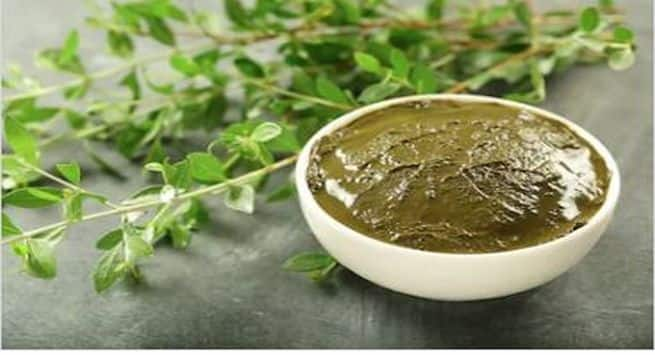Table of Contents
 Henna Mehndi: Benefits And Side Effects
Henna Mehndi: Benefits And Side Effects
Henna (Lawsonia Inermis) is a plant-based dye created from the henna tree, also known as the Egyptian privet, and mignonette tree. The leaves of the henna plant contain a natural coloring pigment that is used for temporary body art, coloring hair, dyeing skin, fingernails as well as fabrics such as leather, wool, and silk. It is used for your hair because it acts as a natural dye, promotes hair growth, conditions the hair, and adds shine. Ayurveda recommends Mehendi for its healing and cold properties. In addition, because of its astringent and drying properties, applying Mehendi aids in the management of dandruff.
Benefits Of Henna Mehndi for Hair & Skin
- Henna Mehndi Helps you to get rid of a headache, especially if it starts in your temple and spreads to the center of your head. One of the kinds of headaches called the Pitta headache is caused by an aggravation of Pitta dosha. Mehendi relieves Pitta’s headaches by balancing Pitta. This is because of its ‘Sita’ (cold) power.
- Mehndi Aids in the control of diarrheal frequency.
- Henna is sometimes applied to the affected area for dandruff, eczema, scabies, fungal infections, and wounds.
- Henna is also applied to the skin as a temporary “tattoo.”
- Henna strengthens the hair, prevents breaking them, improves hair growth, and makes hair shine. It also helps prevent dandruff.
- It is a natural hair dye.
- Using a henna-based conditioner also helps to balance oil production on the scalp.
- Henna, an organic herbal ingredient, is an excellent dyeing agent for covering up greying and aging hair.
Side Effects Of Mehndi
- When used on the hair or skin, henna is safe for most adults. However, it can cause skin inflammation (dermatitis), which includes redness, itching, burning, swelling, scaling, broken skin, blisters, and scarring. In addition, rarely allergic reactions such as hives, runny nose, wheezing, and asthma can occur.
- Most varieties of henna are perfectly safe and non-toxic, but Black Henna might have allergic reactions. In addition, Henna Based Hair dyes might have other chemicals which might be harmful to sensitive skin; thus, read the label carefully before using any product.
- Henna Mehndi is unsafe when it is taken orally.
- Accidentally ingesting henna necessitates immediate medical attention.


 Henna Mehndi: Benefits And Side Effects
Henna Mehndi: Benefits And Side Effects